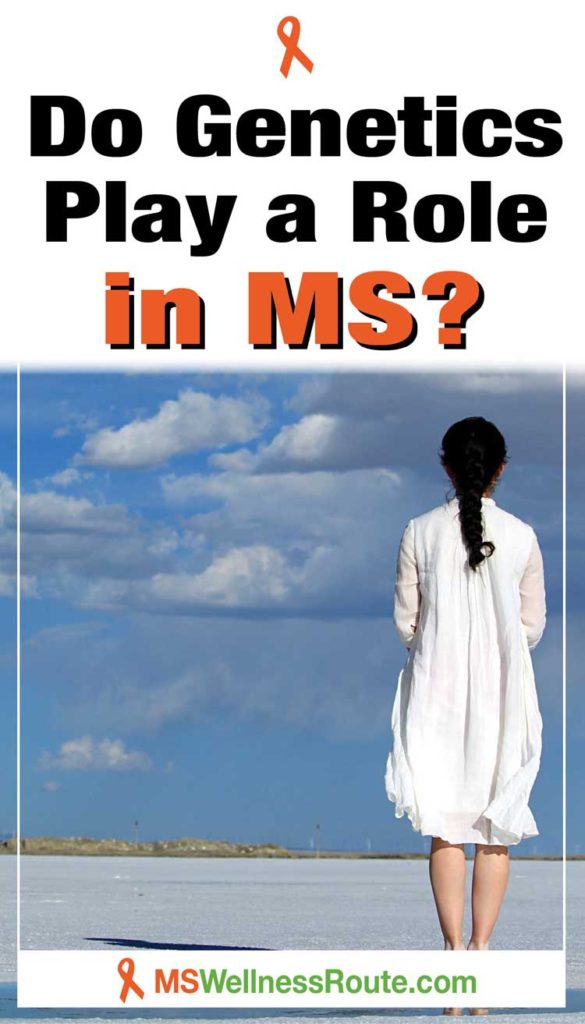Last Updated on November 18, 2023 by Cathy

Multiple sclerosis (MS) is the most common disabling neurological disorder of young adults. MS is not an inherited disease but it can run in families. Having a relative with MS increases a person’s risk of developing the disease. Do genetics play a role in MS?
Even if no one in your family has MS you may have a mutated HLA-DR gene putting you at a higher risk. HLA stands for “human leukocyte antigens.” It is responsible for the regulation of the immune system.
However, having a mutated HLA-DR gene does not guarantee you will develop MS. Researchers discovered this when they studied identical twins. When one twin has MS the odds that the other twin will develop MS is only a 30% chance. This means there’s a 70% chance the other twin won’t develop MS.
“Genes Load The Gun but Lifestyle Pulls the Trigger” – Mehmet Oz
This led researchers to believe environmental factors played an important role. Twins may enter the world with the same genetic risk for MS. But, their habits and exposures determine whether they develop MS or not.
This is good news. – Why?
Because YOU can control your environment and your behavior.
DNA
You inherit two copies of each gene, one from your mother and one from your father. If a mistake happens in a DNA sequence as it’s copied it becomes mutated.
It is possible to inherit no mutation from one parent and a mutation from the other. This does not mean the gene is nonfunctioning, instead, it is working at a decreased level. It could also mean that it is functioning at a higher-than-normal level.
Learning about your DNA becomes helpful when you are trying to heal your body. Genetic testing helps by providing information you would not have otherwise known. Although you cannot change your genetic code, you can change the expression of your genes.
23andMe DNA Health
A 23andMe DNA Health + Ancestry test allows you to find out about your health information. The results will tell you some information but not everything. Fortunately, you can take your raw data and use a third party to get more details. Some sites cost money while others are free.
To learn more about third-party DNA tests read: DNA Test For Multiple Sclerosis
As the name says, 23andMe DNA Health + Ancestry also includes your ancestry. It is fun to find out who you are and to see where your ancestors came from. You may even find some shocking family surprises.
It will also tell you fun facts like if you are more likely to be able to smell the asparagus odor in your urine. Or if you are likely to get bit by mosquitoes more often than others.
Knowing your genetics gives you the ability to lower risk factors. This gives you the ability to change your gene expression for the better. Below are some genes worth looking into:
AHCY Mutations
AHCY helps in breaking down the amino acid methionine (an essential amino acid). A mutated AHCY can affect levels of homocysteine, a chemical in the blood, and ammonia. These relay signals in the nervous system (neurotransmitters).
BHMT Mutations
The BHMT gene helps convert homocysteine to methionine. A mutation can cause problems with gut function, homocysteine imbalance, and liver detoxification.
CBS Mutations
A CBS mutation means the CBS enzyme is working too fast. This causes problems with detoxification, immune function, and the function of other antioxidants. Which leads to recurrent bacterial, fungal, parasitic, and viral infections.
Also, CBS mutation leads to excess amounts of sulfur in the body. It is best for people with a CBS mutation to reduce sulfur-rich foods and Epsom salt baths.
COMT Mutation
The COMT gene creates a healthy balance of neurotransmitters for a healthy brain. A COMT mutation causes brain fog, fatigue, hormone imbalances, and neurological disorders.
CYP2D6 Mutation

The CYP2D6 gene is the liver detox gene. Knowing which variant you have can help in finding out which medications will work best for you. It is also highly expressed in areas of the central nervous system.
CYP2D6 is responsible for the metabolism and elimination of certain medications. Some people will eliminate these drugs quickly while others slowly. If a drug is quickly metabolized, the person isn’t getting enough of the drug to work efficiently. If the drug is slowly metabolized, the person is getting too much of the drug.
MAO-A Mutation
MAO-A is also known as the “warrior gene.” It is a critical enzyme involved in breaking down important neurotransmitters. Such as dopamine and serotonin. The gene comes from the X chromosome so only males can have two copies for this mutation.
Biological females have two copies of the X chromosomes (XX). Biological males only have one X chromosome (XY).
However, when there is an MAO-A mutation and a COMT mutation, imbalances may be more severe. Imbalances can lead to aggression, anxiety, obsessive-compulsive disorder (OCD), and mood swings.
MTHFR Mutation
No, this does not stand for a swear word. Instead, stands for “methylenetetrahydrofolate reductase. It makes instructions for making an enzyme that plays a role in processing amino acids.
A mutated MTHFR gene may lead to elevated levels of homocysteine. This can lead to depression, cardiovascular disease, cognitive impairment, osteoporosis, and MS. The MTHFR gene contains instructions for making an enzyme for metabolizing folate. Folate is also called folic acid or vitamin B9.
It also helps our cells recycle homocysteine into methionine. Which is a building block for proteins. Vitamins B6, B12, and folate break down homocysteine. Having a mutated MTHFR gene can lead to decreased levels of folate. Which in turn increases levels of homocysteine.
MS patients tend to have elevated homocysteine blood levels compared to healthy people.
You can also get a blood test to see where your homocysteine level is at. Talk to your doctor or use an online lab like Walk-In Labs or Health Testing Centers.
MTR/MTRR Mutation

MTR/MTRR are necessary for vitamin B12 production. People with an MTR/MTRR mutation need to take extra vitamin B12 because their bodies can’t make enough. Symptoms include constipation, fatigue, and neurologic problems (abnormal gait, demyelination, numbness).
VDR Mutation
VDR stands for vitamin D receptor. Every single cell in your body uses vitamin D. Having a vitamin D deficiency increases a person’s risk of developing MS. It also reduces the frequency and severity of symptoms.
Having a VDR mutation makes it hard for your body to absorb vitamin D. Low vitamin D is a risk to neurological conditions such as dementia, MS, and Parkinson’s disease.
“VDR FokI (rs2228570) polymorphism was significantly associated with developing MS.” – PubMed
If you have a VDR gene mutation you need to take a higher dose to keep your level up. It is very important to get tested and take a vitamin D supplement.
To learn more about vitamin D read Multiple Sclerosis And Vitamin D
The X Chromosome

Autoimmune diseases affect women more often than men. MS affects women three times more than men. One theory is due to the X chromosome. Biological females have two X chromosomes while biological males only have one.
It is uncertain if the X chromosome is to blame until there are more studies. One thing researchers do know, the immune system betrays females more often than males.
DNA Is Not Your Destiny
The majority of chronic diseases happen due to diet, lifestyle habits, and toxic exposures. Bacteria, chemicals, environmental toxins, various kinds of nutrients, sedentary lifestyle, stress, and viruses all play a role.
You can’t change your genes but you can change your gene expression by living a healthy lifestyle.

Free Wellness Library!
Subscribe for free and I’ll send you the password to my secret library filled with many printables for your wellness journey.
Get Access to my FREE Library!

Subscribe for free and I'll send you the password to my secret library filled with MANY printables for your wellness journey.
You'll also be subscribed to my weekly newsletter with extra tips to get MS into remission and occasional recipes!
Enter my free resource library for my latest files and printables! Password is 'healthy' -- please copy and paste that in at the link above. Thanks for being a subscriber!!
Want to remember this health tip? Pin it to your Pinterest board!

Resources:
https://www.nih.gov/news-events/nih-research-matters/genes-linked-multiple-sclerosis
https://www.ncbi.nlm.nih.gov/pmc/articles/PMC1181903/
https://www.ahajournals.org/doi/full/10.1161/CIRCULATIONAHA.114.013311
https://www.ncbi.nlm.nih.gov/pubmed/27130656
https://pubmed.ncbi.nlm.nih.gov/33044390/
https://en.wikipedia.org/wiki/CYP2D6
Photos courtesy of Pixabay, Andrea Piacquadio from Pexels, and Jure Širić from Pexels
Do genetics play a role in MS?
 MS Awareness Month Sale! All Ebooks 50% Off!
MS Awareness Month Sale! All Ebooks 50% Off! 




